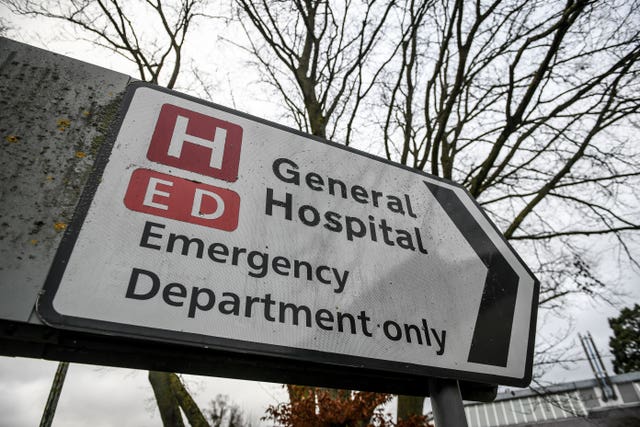
The number of people with dementia admitted to hospital when it could be avoided is set to spiral, a charity has warned.
Figures from the Alzheimer’s Society, based on a snapshot of 45 NHS trusts in the UK, found that, even before the pandemic, avoidable hospital admissions were rising and it expects this could get worse due to inadequate social care.
The charity said that, in the last month alone, it has heard “shocking” reports of people with dementia losing the ability to walk, getting pneumonia, and being rushed to hospital with avoidable kidney damage from dehydration.
Data from 45 trusts under the Freedom of Information Act found a 27% rise between 2015 and 2019 in avoidable admissions for dementia patients, from 60,023 to 76,369.
The Alzheimer’s Society asked how many over-65s with dementia had experienced an emergency admission that could have potentially been avoided through improved and earlier support in the community.

This included falls, delirium, gastroenteritis, flu, chest infections, urinary tract infections and dehydration.
The charity found, that in 2019, nearly two thirds (65%) of all emergency admissions of people with dementia were for avoidable illnesses and injuries caused by failures in care.
It said that, while an increase in the number of people with dementia has contributed in part to the rise in admissions, cuts in spending on adult social care have had a bigger impact.
It comes after charities, politicians and campaign groups expressed concern at the lack of a full plan for social care in the Queen’s Speech last week.
Boris Johnson promised reform of the system when he became Prime Minister in July 2019.
Standing on Downing Street, he said: “My job is to protect you or your parents or grandparents from the fear of having to sell your home to pay for the costs of care.
‘And so I am announcing now, on the steps of Downing Street, that we will fix the crisis in social care once and for all with a clear plan we have prepared to give every older person the dignity and security they deserve.”
To mark Dementia Action Week, the Alzheimer’s Society is releasing a new TV advert calling on the Government to “cure the care system”.
An accompanying survey of 795 unpaid dementia carers found that 48% had performed tasks they felt unqualified to carry out because of a lack of support, and, as a result, 72% of people with dementia experienced medical issues at home.
Around three in 10 with dementia had experienced avoidable falls (29%), one in six missed medication (16%) and one in five hurt themselves in the house (22%), according to the poll.
One in nine (11%) carers also reported their loved one being rushed to hospital in an avoidable emergency.
When it came to the impact on their own health, 95% of carers said their physical or mental health was affected, 69% felt constantly exhausted, 64% were anxious and 49% were depressed.
Kate Lee, chief executive officer at the Alzheimer’s Society, said: “Lockdown has left people with dementia cut off from vital support and care.
“Interrupted routines, loneliness and isolation have contributed to rapid symptom progression, meaning there’s now more people than ever fighting for scarce dementia care.
“Without urgent action, avoidable hospital admissions will skyrocket, costing the NHS millions.”
Ms Lee said decades of chronic underfunding and neglect “have led to a care system that’s inadequate and deeply unfair” and the pandemic “has exposed these failings like never before”.
She added: “People with dementia have been worst hit, accounting for over a quarter of all deaths and many more rapidly deteriorating from lockdown’s knock-on effects; family carers are exhausted.
“This cannot be the kind of society that we expect today and that we want to grow old in, never again must people affected by dementia face such devastation.
“The legacy of this terrible year must be a reformed social care system, which is free at the point of use and put on an equal footing with the NHS.”


Comments: Our rules
We want our comments to be a lively and valuable part of our community - a place where readers can debate and engage with the most important local issues. The ability to comment on our stories is a privilege, not a right, however, and that privilege may be withdrawn if it is abused or misused.
Please report any comments that break our rules.
Read the rules here